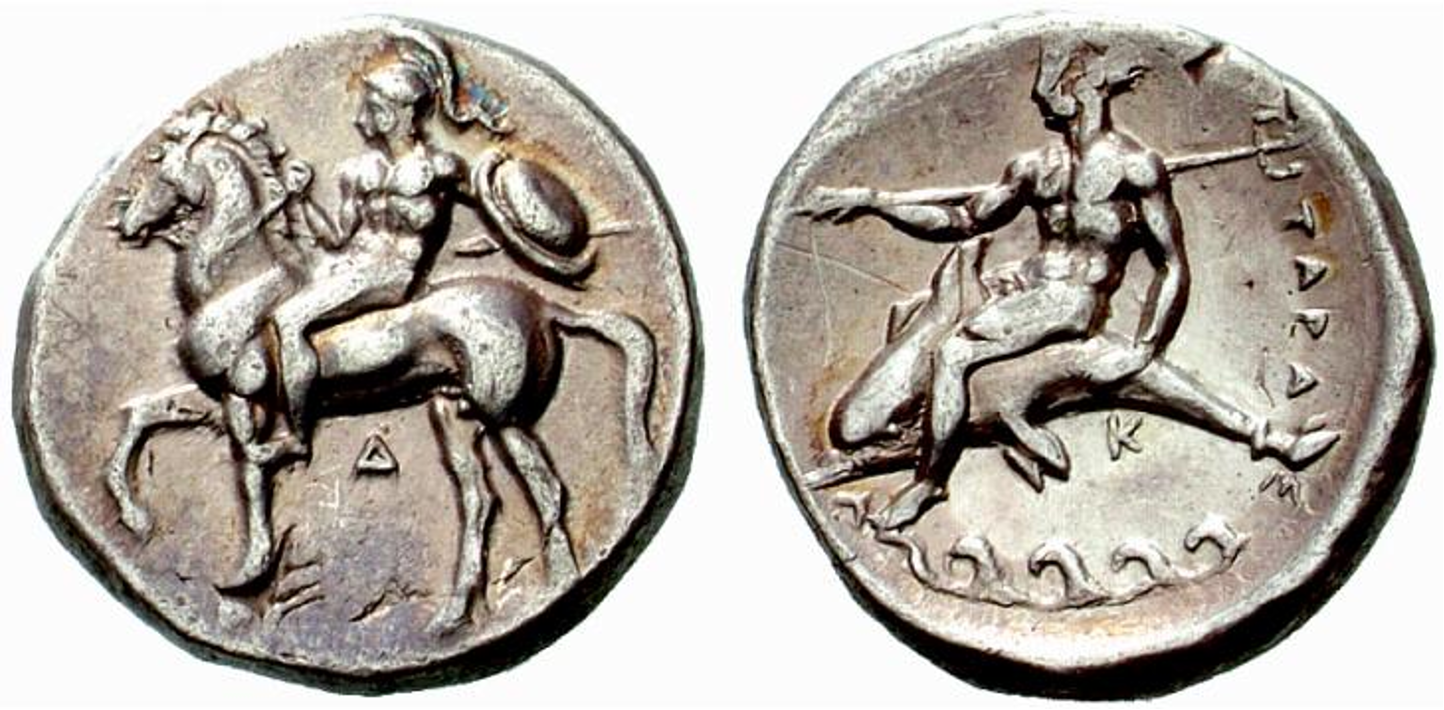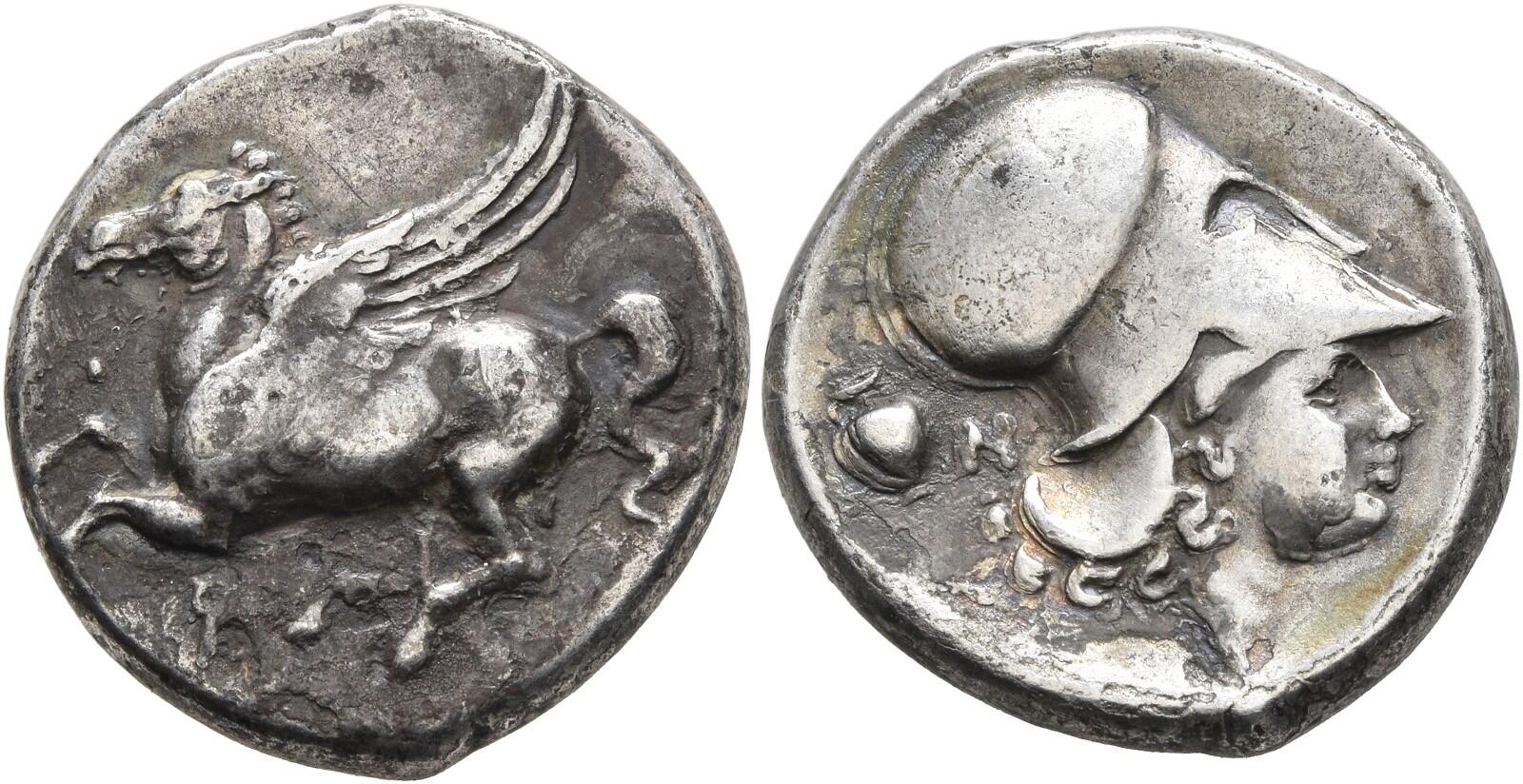346 BCE - 340 BCE | TAPAΣ
Overstriking coin
SO 1347 - Taras over uncertain mint.png
[1]
Overstruck variety
Corinth (head r.).jpg
|
|
Sale(s)Sale(s) ᵖ:
|
Numismatica Ars Classica, R, 17 May 2007, 1018
|
|
|
|
Description
| ObverseInscription or printing placed on the obverse.:
|
Male character seated on horse left, nude, wearing helmet, holding reins in one hand, spear and shield in the other. Below horse belly, Δ.
|
ReverseInscription or printing placed on the reverse.:
|
TAPAΣ (Greek) Male character (Taras or Phalanthos), nude, seated on a dolphin to left, holding trident. Below, K and wave pattern.
|
Mint and issuing power
| MintIdentifies the place of manufacture or issue of a numismatic object.:
|
Taras
|
Ancient regionAncient region.
|
Calabria
|
Modern countryModern country: Italy
|
AuthorityIdentifies the issuing power. The authority can be "pretended" when the name or the portrait of X is on the coin but he/she was not the issuing power. It can also be "uncertain" when there is no mention of X on the coin but he/she was the issuing power according to the historical sources:
|
|
Chronology
| FromIdentifies the initial date in a range assigned in a numismatic context. 346 BCE toIdentifies the final date in a range assigned in a numismatic context.. 340 BCE
|
Classical 480-323 BC  periodTime period of the numismatic object. periodTime period of the numismatic object.
|
Physical description
MetalThe physical material (usually metal) from which an object is made.: Silver 
|
WeightWeight of the numismatic object (in grams). in grams: 7.857.85 g <br />7,850 mg <br />
|
DenominationTerm indicating the value of a numismatic object. Examples: tetradrachm, chalkous, denarius.: nomos
|
|
|
|
StandardStandard.: Achaian
|
References
Description
| ObverseInscription or printing placed on the obverse.:
|
Pegasus flying
|
ReverseInscription or printing placed on the reverse.:
|
Head of Athena right, wearing a Corinthian helmet
|
Mint and issuing power
| MintIdentifies the place of manufacture or issue of a numismatic object. ᵖ:
|
Corinth
|
Ancient regionAncient region. ᵖ
|
Peloponnesus
|
Modern countryModern country: Greece
|
AuthorityIdentifies the authority in whose name (explicitly or implicitly) a numismatic object was issued. ᵖ:
|
|
Chronology
| FromIdentifies the initial date in a range assigned in a numismatic context. 380 BCE toIdentifies the final date in a range assigned in a numismatic context.. 340 BCE
|
Classical 480-323 BC  periodTime period of the numismatic object. periodTime period of the numismatic object.
|
Physical description
| DenominationTerm indicating the value of a numismatic object. Examples: tetradrachm, chalkous, denarius. ᵖ:
|
stater 
|
|
|
References
References
- ^ Fischer-Bossert, Wolfgang (1999), Chronologie der Didrachmenprägung von Tarent, 510-280 v. Chr., Berlin, De Gruyter, xvii, 495 p., [84] pl.
- ^ Rutter N. Keith et alii (eds.) (2001), Historia Numorum Italy, London, xvi, 223 p., 43 pl.
- ^ Hoover, Oliver D. (2018), The Handbook of Greek Coinage Series, Volume 1. Handbook of Coins of Italy and Magna Graecia, Sixth to First Centuries BC., Lancaster-London, 2018, lxi, 527 pages, 23 cm
- ^ Calciati, Romolo (1990), Pegasi, Mortara, Edizioni I.P..


